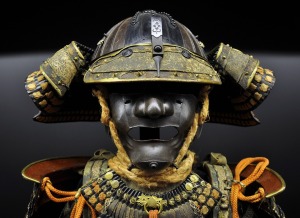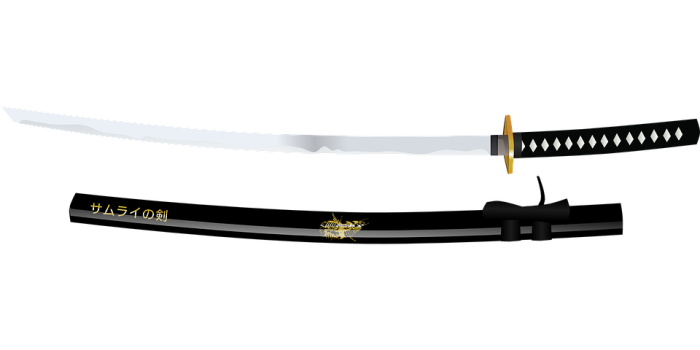
We live in times where our “leaders” at the top lecture us on duty and responsibility, yet aggregate to themselves a larger and larger portion of the pie. They grow fat on your labor, and on your backs; and yet you have very little to call your own.
And in their spare time, they sweep away our cultural inheritance to make way for corrupting entertainments, distracting amusements, and intoxicating spectacles that offer nothing in the way of meaningful value. We see this as the lesson of the great film Harakiri (1962). It is one of the great samurai films, and a powerful indictment of institutional hypocrisy.
A poor, masterless samurai (Hanshiro) arrives at the castle of a powerful clan, to commit ritual suicide (seppuku). The senior counselor of the clan tells Hanshiro that a few months earlier, another samurai (Motome) had tried to do the same thing. The unspoken game is that, at the last minute, the clan leader is supposed to talk the samurai out of killing himself and give him some money.
So it really is a ritualized request for alms.
Three powerful clan members, however, get tired of this game. They are samurai themselves. Angered by the rising incidence of these fake suicide “shakedowns”, they had ordered Motome to actually go through with it. His blade is made of bamboo, but he is forced to commit suicide anyway. It is a sadistic and vicious act, but they order him to kill himself.
It is a ghastly, slow, and agonizing process. And the clan’s top samurai dogs couldn’t care less. They are, in fact, amused. And they intone pieties about how this is “the way it’s supposed to be.” They, of course, are guardians of the ancient code. They know better than anyone (so they think) about what is right and wrong.
But Hanshiro says he didn’t know Motome. He wants to kill himself for real, he pleads. So everything is prepared in the courtyard. He is asked who he wants to behead him after he has thrust his blade into his belly. Hanshiro names the three clan bigwigs (the three samurai) who had cruelly forced Motome to kill himself with his bamboo blade.

The three samurai are nowhere to be found. We are told that they are suffering from an unspecified “illness.” And then Hanshiro begins to laugh a bitter, mocking laugh. He says that he did in fact know Motome.
It turns out that Hanshiro had been assigned the job of being guardian of Motome when he (Motome) was a teenager. Hanshiro worked hard to support Motome and his own daughter Miho, who eventually fell in love with and married Motome. But hard times come and Motome could not care for his wife and newborn son Kingo. And this was why he had gone to the clan’s castle to do a supposed “suicide.” He was desperate and needed the money.
The three arrogant bigwig samurai who forced Motome to kill himself are the ones who returned his body to his family. They mock him and his bamboo blades, laughing at his poverty. And then things just get worse. Miho and Kingo die of want.
All of this story is related by Hanshiro in a courtyard filled with other samurai. It is a gripping account, told with passion and bitterness. But the leader of the clan is not impressed. He says that Motome was nothing but a shabby extortioner and got what he deserved.
But Hanshiro is not done.
Laughing, he relates how he tracked down the three arrogant samurai who drove Motome to his death. He defeated them in duels with swords, and cut off their topknots. For a samurai to lose his topknot to an enemy was an ultimate disgrace. It was like being “scalped” in the old American West.
Any samurai who got his topknot shorn off would be expected to commit suicide automatically. And this, Hanshiro laughingly tells the assembled court, was not what the three samurai did. This was why they are not here today, he says. They ran and hid in shame. They, the same ones who cruelly forced another man to kill himself with a bamboo blade.
It is because they are hiding in disgrace until their hair grows back. Why aren’t they themselves committing seppuku?
They expect others to follow the code of bushido, but not themselves. This is the crux of the matter. The naked hypocrisy of the top dogs. They want everyone else to play by the rules, but they themselves are exempt.
The leader of the clan, enraged at hearing all this, orders his men to kill Hanshiro. He fights them bravely, but is killed finally with some muskets. (This is another pathetic act of the clan, as the failure to defeat Hanshiro in swordplay shows their martial ineptitude). So this is the story. It is a powerful parable. It has the ring of truth for our times, as well as for feudal Japan.
It is a great tale, one of the profoundest of the old samurai allegories, and a devastating indictment.
We live in an age of avarice, cowardice, and shirking of responsibility by our world “leaders.” They pay lip service to the idea that a leader should lead from the front, and should set the example, but the reality for them is quite different. They do not lead by example. They do not inspire respect by virtue of their courage, justice, or self-sacrifice. They want all the privileges of office, with none of the sacred responsibilities that come with the office. If more of these so-called “leaders” were interested in the responsibilities that come with the privileges of office, our societies would not be in the condition they are now.
We must learn to rely on ourselves, and only ourselves. The notables above us see themselves as exempt from the rules that everyone else has to follow.
Do what I say, not what I do: this is the whole of their ethic.
Read Pantheon for more adventures from history, biography, and the mind.

You must be logged in to post a comment.